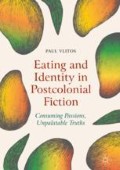Abstract
In my conclusion I examine the role of food—in particular in relation to the politics of vegetarianism—in M.K. Gandhi’s My Autobiography or the Story of My Experiments with Truth, read in juxtaposition with non-fictional and fictional writings by V.S. Naipaul and Salman Rushdie and the criticism of Parama Roy, Colin Spencer, and Leela Gandhi. Also discussed is the politics of the hunger strike, both in Gandhi’s writings and in Rushdie’s novel Midnight’s Children. The chapter concludes with an overview of the ways in which greater attention to food and eating in the novels of the four authors on which this book has focused offers new ways not only of reading their works but of thinking about identity, empire, and its legacies.
Access this chapter
Tax calculation will be finalised at checkout
Purchases are for personal use only
Notes
- 1.
Mohandas Karamchand Gandhi , An Autobiography, or the Story of My Experiments with Truth , trans. Mahadev Desai (London: Penguin, 1982), p.69. All subsequent page references are to this edition.
- 2.
Colin Spencer, The Heretic’s Feast: A History of Vegetarianism (London: Fourth Estate, 1993), p.287. Spencer discusses Gandhi and his relationship to the Vegetarian Society, pp.291–3. See also Henry Salt, The Savour of Salt: A Henry Salt Anthology, ed. George Hendrick and Willene Hendrick (Fontwell: Centaur, 1989).
- 3.
Jeffrey Weeks, Coming Out: Homosexual Politics in Britain from the Nineteenth Century to the Present (Quartet, 1977), p.80. Quoted in Spencer , pp.285, 284. Terry Eagleton’s unpublished PhD dissertation discusses the poet, essayist, social reformer, and philosopher (1844–1929) and notes his interest in the Upanishads and Hindu thought. Terence Francis Eagleton, ‘Nature and Spirit : A Study of Edward Carpenter in his Intellectual Context’ (unpublished doctoral thesis, Cambridge, 1968), p.197.
- 4.
Spencer , p.287. This milieu, and the impact upon Gandhi of his immersion in it, is explored more fully by Leela Gandhi in Affective Communities: Anticolonial Thought, Fin-de-Siècle Radicalism, and the Politics of Friendship (Durham: Duke University Press, 2006), pp.67–76.
- 5.
Spencer, p.292.
- 6.
Leela Gandhi , Affective Communities, p.83.
- 7.
V.S. Naipaul, India: A Wounded Civilization (London: Penguin, 1979), p.98. All subsequent page references are to this edition. Naipaul states that he has read An Autobiography or the Story of my Experiments with Truth in Mahadev Desai’s translation (p.97). Naipaul also discusses An Autobiography or the Story of My Experiments with Truth in a chapter entitled ‘Looking and Not Seeing: The Indian Way’, in A Writer’s People: Ways of Looking and Feeling (London: Picador, 2007), which again focuses on the narrative’s ‘strange deficiencies’ but also reveals that Naipaul has read it ‘several times’, reflects on its composition, and suggest that ‘there is enough of the magical early part of the book for it to be considered a masterpiece’ (p.101).
- 8.
M.K. Gandhi, Collected Works, 110 vols (Ahmedabad: Navajivan Trust, 1967–84).
- 9.
Parama Roy , Alimentary Tracts, both quotations p.87. For an account of Gandhi ’s thinking on food and diet which engages with his complete works, see Joseph S. Alter’s Gandhi’s Body: Sex, Diet and the Politics of Nationalism, which places particular emphasis on ‘food’s intimate relationship to self-control’ in Gandhian thinking. Joseph S. Alter, Gandhi’s Body: Sex, Diet and the Politics of Nationalism (Philadelphia: University of Pennsylvania Press, 2000), p.20.
- 10.
Parama Roy, Alimentary Tracts, pp.26, 87.
- 11.
John Hearne, ‘The Snow Virgin: An Inquiry into V.S. Naipaul’s The Mimic Men ’, Caribbean Quarterly, 23.2 & 3 (June–September 1977), 31–7 (p.36).
- 12.
Salman Rushdie, Midnight’s Children (London: Vintage, 1995), p.59.
- 13.
M.K. Gandhi, ‘Interview to Vaikom Deputation (May 20th 1924)’, in Collected Works, 110 vols (Ahmedabad: Navajivan Trust, 1967–84) XXIV (1967), 90–4 (p.90). For a fuller account of the history of hunger striking as a means of political protest in the modern era, see James Vernon’s Hunger: A Modern History (Cambridge, MA: The Belknap Press, 2007), pp.60–80. Vernon observes that for Gandhi ‘the practice of fasting became […] the supreme test of his own self-discipline and an act of penance for a sinful nation, as well as a moral challenge to British colonial rule’ (p.70). Parama Roy also offers an extended and suggestive discussion of Gandhi’s fasts, considered both ‘as a corporeal and spiritual process and as an ethicopolitical tactic’ (p.99) in Alimentary Tracts, pp.95–104.
- 14.
M.K. Gandhi, ‘Interview to Vaikom Deputation (May 20th 1924)’, p.91.
- 15.
Salman Rushdie ‘Attenborough’s Gandhi ’, Imaginary Homeland : Essays and Criticism 1981–1991, pp.102–6 (pp.102, 103). Salman Rushdie, ‘Gandhi , Now’, in Step Across This Line : Collected Non-Fiction 1992–2002 (London: Vintage, 2003), pp.180–5. All subsequent page references are to this edition.
- 16.
Gayatri Chakravorty Spivak quoted by Lukas Barr, ‘An Interview with Gayatri Chakravorty Spivak’, Blast Unlimited (Summer 1989), 6–8 (p.7). Quoted in Maud Ellmann, The Hunger Artists: Starving, Writing and Imprisonment (London: Virago, 1993), p.5.
- 17.
Maud Ellmann, The Hunger Artists , p.43. This quotation was previously cited in relation to Anita Desai’s Fasting, Feasting , a novel in which Anita Desai uses two tropes discussed in this conclusion: Arun’s father believes meat-eating gives strength, and Melanie Patton embarks on a programme of self-starvation for which the text refuses to produce a single stable explanatory narrative.
- 18.
Homi K. Bhabha, ‘Introduction: Locations of Culture’, in The Location of Culture (London/New York: Routledge, 1994), pp.1–18, p.4.
- 19.
Anita Mannur, Culinary Fictions, p.3.
Author information
Authors and Affiliations
Rights and permissions
Copyright information
© 2018 The Author(s)
About this chapter
Cite this chapter
Vlitos, P. (2018). Conclusion. In: Eating and Identity in Postcolonial Fiction. Palgrave Macmillan, Cham. https://doi.org/10.1007/978-3-319-96442-3_6
Download citation
DOI: https://doi.org/10.1007/978-3-319-96442-3_6
Published:
Publisher Name: Palgrave Macmillan, Cham
Print ISBN: 978-3-319-96441-6
Online ISBN: 978-3-319-96442-3
eBook Packages: Literature, Cultural and Media StudiesLiterature, Cultural and Media Studies (R0)

